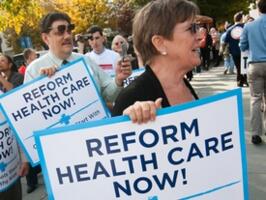27% Say Their Insurance Has Changed Because of Health Care Law
Most voters remain unhappy with the new national health care law, with more than one-in-four continuing to say the law has changed their health insurance coverage.
A new Rasmussen Reports national telephone survey finds that 41% of Likely U.S. Voters share at least a somewhat favorable opinion of the health care law, while 54% view it unfavorably. This includes 20% with a Very Favorable opinion of the law and 42% with a Very Unfavorable one. (To see survey question wording, click here.)
Unfavorables are down slightly from an all-time high of 58% in mid-November, while favorables remain near their low for the year.
Twelve percent (12%) say they personally have been helped by the law, while 30% say they have been hurt by it. Fifty-three percent (53%) say Obamacare has had no impact on their lives. These findings are unchanged from last month and are consistent with regular surveys for most of the year.
Twenty-seven percent (27%) of voters say their health insurance coverage has changed because of the law, consistent with findings since August. Sixty-one percent (61%) say their coverage has not been affected, while 11% are not sure.
Opposition to the law’s requirement that every American buy or obtain health insurance has hit an all-time high of 58%. Because of the problems surrounding the rollout of the health care law since October 1, the Obama administration announced last week that this individual mandate will be delayed for several months for some Americans.
Most voters (56%) still believe that increased free market competition will do more than increased government regulation to reduce health care costs, but that’s down six points from 62% in November and the lowest level of support this year. Still, just half as many (27%) think more government regulations are the better way to reduce health care costs. Seventeen percent (17%) are undecided.
Thirty percent (30%) say that having the federal government establish a single set of standards and regulations will do more to reduce health care costs than letting individual states determine the most effective standards and guidelines. That’s down from 32% last month and a low for the year. Fifty-five percent (55%) disagree and think letting states set the standards will do more to reduce costs. Sixteen percent (16%) are not sure.
(Want a free daily e-mail update? If it's in the news, it's in our polls). Rasmussen Reports updates are also available on Twitter or Facebook.
The survey of 1,000 Likely Voters was conducted on December 20-21, 2013 by Rasmussen Reports. The margin of sampling error is +/- 3 percentage points with a 95% level of confidence. Field work for all Rasmussen Reports surveys is conducted by Pulse Opinion Research, LLC. See methodology.
Seventy-two percent (72%) of Democrats view the health care law favorably. Eighty-five percent (85%) of Republicans and 62% of voters not affiliated with either major party regard the law unfavorably.
Voters 40 and older remain more critical of the law than those who are younger. Interestingly, voters under 40 are more likely than their elders to have been both helped and hurt by Obamacare.
Thirty-four percent (34%) of Republicans and 36% of unaffiliated voters say their health insurance has been changed as a result of the new law, compared to just 15% of Democrats.
Married voters have a much less favorable opinion of the health care law than those who are not married do.
Eighty-five percent (85%) of voters who believe more government regulation is the better way to reduce health care costs have a favorable opinion of the new law. Seventy-nine percent (79%) of those who view more free market competition as a better cost-reducer share an unfavorable opinion of the law.
Voters continue to strongly believe that Americans should be able to choose how much health insurance coverage they want and how much they want to spend on it.
Fifty-six percent (56%) believe the U.S. health care system is likely to get worse under the new law, while 28% think health care will get better.
Voters overwhelmingly want to change or repeal the new national health care law, including 50% who want to scrap it completely and start over again.
Additional information from this survey and a full demographic breakdown are available to Platinum Members only.
Please sign up for the Rasmussen Reports daily e-mail update (it’s free) or follow us on Twitter or Facebook. Let us keep you up to date with the latest public opinion news.
The survey of 1,000 Likely Voters was conducted on December 20-21, 2013 by Rasmussen Reports. The margin of sampling error is +/- 3 percentage points with a 95% level of confidence. Field work for all Rasmussen Reports surveys is conducted by Pulse Opinion Research, LLC. See methodology.
Rasmussen Reports is a media company specializing in the collection, publication and distribution of public opinion information.
We conduct public opinion polls on a variety of topics to inform our audience on events in the news and other topics of interest. To ensure editorial control and independence, we pay for the polls ourselves and generate revenue through the sale of subscriptions, sponsorships, and advertising. Nightly polling on politics, business and lifestyle topics provides the content to update the Rasmussen Reports web site many times each day. If it's in the news, it's in our polls. Additionally, the data drives a daily update newsletter and various media outlets across the country.
Some information, including the Rasmussen Reports daily Presidential Tracking Poll and commentaries are available for free to the general public. Subscriptions are available for $4.95 a month or 34.95 a year that provide subscribers with exclusive access to more than 20 stories per week on upcoming elections, consumer confidence, and issues that affect us all. For those who are really into the numbers, Platinum Members can review demographic crosstabs and a full history of our data.
To learn more about our methodology, click here.





